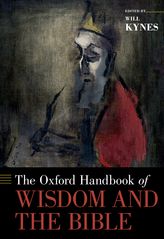Kynes, Will, ed. The Oxford Handbook of Wisdom and the Bible. New York: Oxford University Pres, 2021, pp. 712, $150, hardback.
Will Kynes is Associate Professor of Biblical Studies at Samford University. Kynes has authored and edited several books, including his most famous book, An Obituary for “Wisdom Literature”: The Birth, Death, and Intertextual Reintegration of a Biblical Corpus (2019) and editing alongside Katharine Dell Reading Job Intertextually (2013), Reading Ecclesiastes Intertextually (2014), and Reading Proverbs Intertextually (2018). Following is a summary, a review of the handbook, and a recommendation for the best use of the book.
The Oxford Handbook of Wisdom and the Bible is a collection of entries on “Wisdom Literature,” many from renowned scholars such as Raymond Van Leeuwen, Norman Habel, Mark Sneed, and Tremper Longman III. Each essay contributes to reflections on the concept of wisdom and the issue of wisdom literature as a genre (inside front cover). The handbook is divided into two parts. The first section is about “wisdom as a concept, and the second section addresses “‘Wisdom Literature’ as a category” (p. 11). The handbook studies a large chronological window. This captures the concept and development of wisdom literature from pre-biblical books to Rabbinic interpretation of wisdom. Similarly, the dictionary provides perspectives for interpreting wisdom books along with multiple culture contexts “beyond Western perspectives” (p. 10).
The volume accomplishes its two-fold goal of informing the reader on wisdom and the Bible, and communicating the scholarly debate concerning the nature of Wisdom Literature. First, the book covers a wide scope of content on Wisdom and the Bible written by the best scholars. The star-studded list of scholars is more significant than that mentioned above. The list of contributors also includes Mark J. Boda, William P. Brown, and more who deserve mention.
Second, the handbook provides the debate about the nature of Wisdom Literature in a balanced manner. The balance between views in the volume is not necessarily opposing forces. Rather, each scholar may share a view upon a spectrum instead of choosing sides. Scholar’s views differ on the problem(s) surrounding the Wisdom Literature corpus and its solution. Kynes argues to abandon “post-Enlightenment presuppositions,” which introduce anachronistic ideas and restrict thought by viewing wisdom as a corpus in Scripture (p. 9, 9 fn.24). Other scholars share this view in the book. Burnside supports Kynes’ view in his entry on “Law and Wisdom Literature” (p. 10). Yet, not every entry proposes a deconstructionist view or projects the same need for a “new” approach to “Wisdom Literature.” Witte’s contribution “Literary Genres of Old Testament Wisdom” discusses the meaningful function of the classification of texts (p. 353). In addition, Witte presents the concept of genre as a classification, its fundamental components, and a survey of the genre “Wisdom Literature” (pp. 354-357). Although Witte also seeks a “fresh” approach to Wisdom Literature, he seeks a shift in how genre is understood (p. 357).
Two negative critiques to the handbook stand out: (1) At times, an unacademic or personal voice to the essays comes through, and (2) a varying quality of entries. First, some entries were too personal or unprofessional. For instance, an entry plugs a forthcoming commentary (p. 530). A different chapter presents the author’s opinion in the introduction, creating a biased reader before presenting the full argument (p. 301). These critiques are minor because presenting future research opportunities and resources and providing clear direction are part of handbook entries. However, these contributions created the voice of a colloquy in contrast to a formal voice that is traditional for such works.
Second, not all contributions are equally helpful or impactful. For instance, chapter 33 stands in contrast to other entries by using sentiments challenging inspiration and use of quasi-Feminist theology. First, the chapter presents the Song of Songs as an “anthology of secular love poems” (p. 552). Second, the chapter writes of Proverbs’ projection of “hidden (and forbidden) desires onto the foreign woman” like “modern Europeans” (p. 559). Also, the entry describes the social milieu of biblical wisdom as one where “women need to be controlled” p. (560). The reader will find little clarity about the inspiration of Song of Songs or data to support the misogynistic views in the Bible. Nevertheless, it aligns with the handbook’s overall goal to teach about wisdom and the Bible in light of the current debate over the nature of Wisdom Literature. Outside of chapter 33, the difference in quality may reflect expectations. Seasoned scholars may find some contributions rudimentary, while new scholars may find entries too technical. This may be a strength, or the observed scale may result from an undefined target audience.
The Oxford Handbook of Wisdom and the Bible is a recommended resource for seminary students and scholars seeking to learn basic tenants of Wisdom Literature in light of the current scholarly debate. Seminary students will find this volume able to teach the basic tenets of the concept of wisdom in the OT, such as wisdom theology, wisdom in the ANE, and summaries of wisdom in Job, Eccl, and Proverbs. Students and scholars can use the handbook to learn how leaders in the field of wisdom in the OT are integrating these familiar categories into the discussion on the viability of Wisdom Literature as a corpus. Also, the volume contains several contributors addressing more novel ideas. Therefore, the work will become a resource to reference for decades. In addition, this volume has the ability to bring clarity to the current debate concerning wisdom as a corpus (or not) while presenting solutions. Therefore, scholars will find this volume a helpful resource for constructing a new path forward or re-constructing an understanding of wisdom in the Bible.
Ross Daniel Harmon
Midwestern Baptist Theological Seminary




